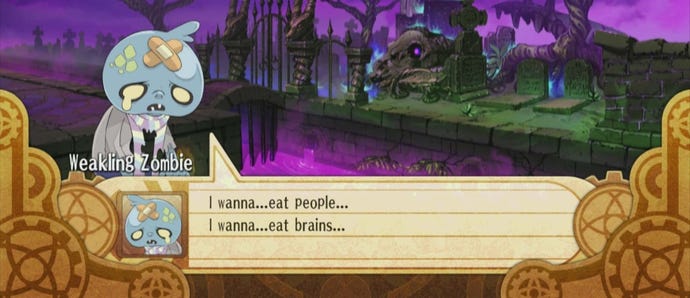JPgamer: The Next Generation
In this week's round-up of all things Japanese, we ask where all the Japanese next-gen games are, and there's news on Guided Fate Paradox, Idea Factory, Bunny Must Die, "Western JRPG" Septerra Core and a teaser from Treasure.
This article first appeared on USgamer, a partner publication of VG247. Some content, such as this article, has been migrated to VG247 for posterity after USgamer's closure - but it has not been edited or further vetted by the VG247 team.
Welcome back, Japanese gaming fans, to JPgamer, USgamer's regular round-up of news, topics and discussion points surrounding games from the East.
This week, I wanted to talk about something that struck me while I was wandering around the recent Eurogamer Expo in the UK. Both Microsoft and Sony had substantial showings on the expo floor, and both were understandably keen to push their next-gen experiences. There were some great games on display... but all of them were Western.
This is perhaps understandable from a show as thoroughly Western as EGX, but the lack of Japanese games on the show floor as a whole was noteworthy -- the only games of Japanese origin that had any degree of prominence whatsoever were Lightning Returns and the Final Fantasy X/X-2 HD remakes.
Is this cause for concern? Perhaps, though it's worth bearing in mind that PlayStation 4 won't be launching until February in Japan, while the rest of the world gets it in the November-December timeframe. Similarly, Xbox One isn't coming to Japan until 2014, either, but the lack of Japanese titles on that particular platform is less surprising still when you consider how much Microsoft has historically struggled in that region.
Here's another reason why I'm not worried -- for now, at least.
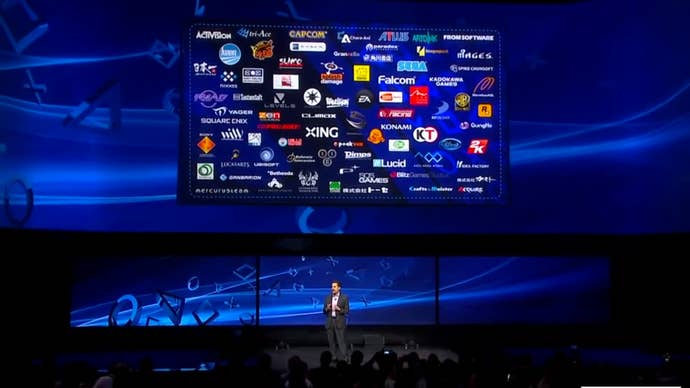
That's a screengrab from Sony's original PS4 reveal show back in February, where Andrew House announced that "virtually every major third-party partner across North America, Europe, Japan and Asia will support PlayStation 4." If you look closely at that screen, you'll see a number of familiar faces, and not just the biggest names in the industry, either -- there's also plenty of smaller developers and publishers who provide more focused content such as tri-Ace, Platinum Games, Ganbarion, Idea Factory, Kadokawa Games, Atlus, Falcom and numerous others.
Another factor worth considering is that Japan appears to have been in significantly less of a hurry to jump headlong into the latest and greatest technology than we have been in the West over the last few years. While we've all (well, some of us, anyway) been playing Call of Duty online in HD with full voice chat that allows us to utter pithy remarks at our opponents, the handheld market has been flourishing in Japan. The strongest evidence for this is the continuing popularity of the 3DS which, after a slow start when it initially launched, is now one of the most popular consoles in the world, and especially in Japan. Sony's still hanging on, too -- though Vita may not have performed as well as the company might have liked, part of the reason for that is that the PSP is still relevant. We're still getting brand new Japanese PSP games (the recent Sweet Fuse is one such example) -- so why upgrade if there's still great stuff coming out for an old platform? (My personal answer to that is that PSP games look particularly lovely on the Vita's OLED screen.)
And then there's the indie question. It's beyond a doubt now that indie games are going to be one of the defining factors in the coming generation, even more so than in this one. Speaking with Shuhei Yoshida at TGS, our own Kat Bailey asked about Sony's distinctive approach to indies, and whether the PlayStation team would be encouraging Japanese indies as much as it's been working with Western developers.
"There is an indie scene [in Japan] already on Steam and PC," said Yoshida. "SCEJA is contacting them and trying to work it out so that they have more interest in making games for the PlayStation platform." Yoshida went on to say that a big personal goal for him was to be able to showcase some Japanese indie games on PlayStation platforms by next year -- ideally by the time PS4 launches in Japan, perhaps?
Short version: although it's looking fairly quiet on the Japanese front when it comes to next-gen, it's something we'll need to give time; in the meantime, we can rest assured that Japanese developers look likely to continue supporting current-gen systems -- and the PSP! -- for a while longer, at least.
The Guided Fate Paradox Gets a Release Date
Those of you who've been waiting patiently for NIS America's PS3 successor to ZHP, The Guided Fate Paradox, don't have much longer to hang on: it'll be with us on November 5.
Those of you who have no idea what I'm talking about, here's a trailer.
The Guided Fate Paradox casts you in the role of, as ever, an "exceptionally ordinary high school student" who wins a lottery and becomes God. Much like the narrative hook in ZHP, which saw you delving into "Bizarro World" versions of people on Earth and helping resolve their problems, in The Guided Fate Paradox you'll be helping guide people's fates by entering the Copy World and doing battles against the things that are holding them back.
Like ZHP, The Guided Fate Paradox is a sort-of roguelike, in which dying causes you to lose all your equipment and levels, but not the end of the game; moreover, levelling up in a single dungeon run propagates to your base stats, so your "level 1" stats become better and better as you progress through the game.
There's a full post about the new game by NIS America's David Alonzo over on the PlayStation Blog, so check that out for further details and some new screens.
Idea Factory Opens International Branch
Idea Factory, the team behind the Agarest and Hyperdimension Neptunia series (as well as the recent Sweet Fuse for PSP) has opened an international branch in California, reports Siliconera.
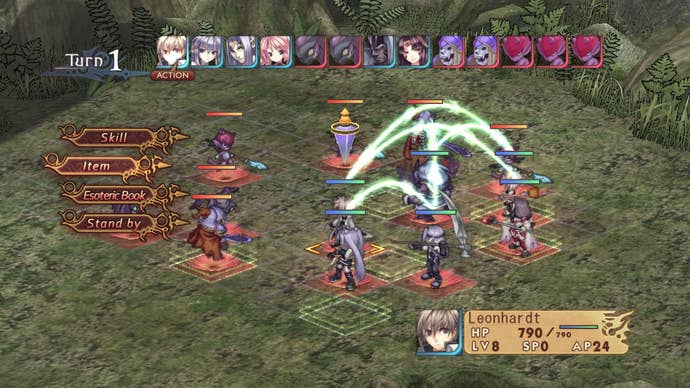
Not much is known about what the new branch will get up to as yet, but the official statement from the company notes that "as it increases the volume of various content it wishes to make available globally, including video games, animation, and social apps, Idea Factory International, Inc. intends to focus on providing general and overall information regarding such Idea Factory properties to North American and European fans, as well as strengthen the Idea Factory brand around the globe." The company will be headed up by Harusato Akenaga, who was the former head of NIS America.
Idea Factory has previously worked with third parties to bring its games to Western audiences -- most notably NIS America for the Hyperdimension Neptunia series and one-offs like Trinity Universe, and Aksys for the Agarest series -- so it will be interesting to see what effect, if any, this has on how many Idea Factory games we'll see in North America and Europe, not to mention whether it'll have an impact on Aksys and NIS America's output.
There's no information on the official website for the new branch as yet, so we'll doubtless find out more when that launches properly.
Bunny Must Die Arrives on Steam
Retro-style platform action game Bunny Must Die! Chelsea and the 7 Devils has been released on Steam. The work of Gundemonium Collection developer Platine Dispositif, it's been available in English for a while thanks to localizer Rockin' Android, but the Steam release will doubtless help it find a significantly wider audience.
Bunny Must Die makes use of a similar graphical style to the Gundemonium series, featuring large, well-animated sprites, but plays very differently. In true Metroid fashion, you'll acquire new abilities as you work your way through the interconnected areas of the game world, and take down the titular 7 Devils.
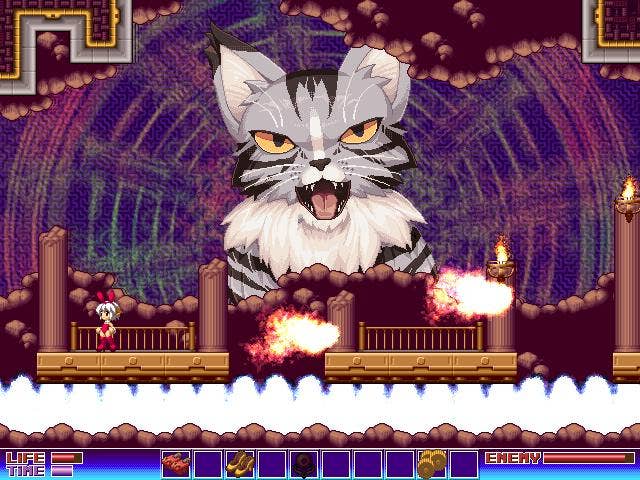
The Steam version features both the original graphics and sound as well as the option to play with remixed sprites and music, with the latter being handled by Woofle, who previously worked on the Gundemonium series' remixed music. If Bunny Must Die's new music is of a similar quality, expect something you'll probably want to crank up the volume for.
Be prepared for a challenge! You can find it here.
Also on Steam: Septerra Core
1999's Septerra Core from Topware Interactive and Valkyrie Studios isn't a Japanese game per se, but it's noteworthy in that it was one of the first attempts by a Western developer to make "a JRPG" -- specifically, one inspired by its contemporaries in the Final Fantasy and Chrono Trigger series. There were some areas in which it was more successful than others, and it looks rather dated today, but it's an interesting game with a neat Final Fantasy VII-ish combat system, plus full voice acting.
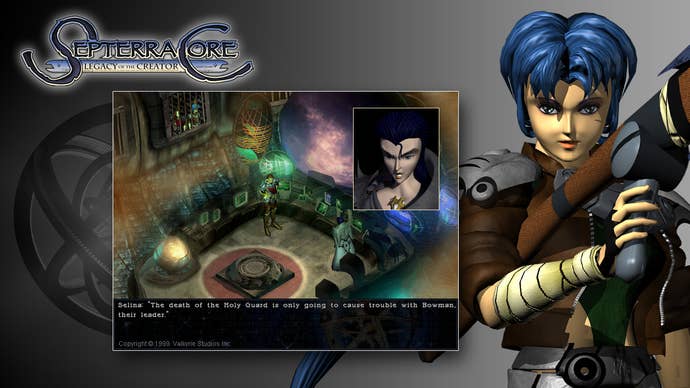
GOG.com rereleased the game a while back, but this week it's hit Steam, too. It's a bare-bones release, however; there aren't any new Steam-specific features such as Steam Cloud or achievements, but it is currently available for 50% off, which makes it just $2.49. In terms of dollars-per-hour, that's hard to beat.
And Finally...
"Some good news about 'Ikaruga' before long," tweeted the official Treasure account a few days ago. "Well, I'll tweet again when the time comes."
The majority of Treasure's other tweets are in Japanese, so for this to be in English made it immediately stand out. Unfortunately, the company has only tweeted three more times since that post was made, with seemingly no further details forthcoming at this time. Any thoughts -- or hopes -- on what the Ikaruga-related announcement might be?
That's it for this week, then! As ever, discussion is very welcome, so make use of the comments and notes to share your thoughts on this week's happenings. See you next Wednesday for another installment of JPgamer. Mata ne!
